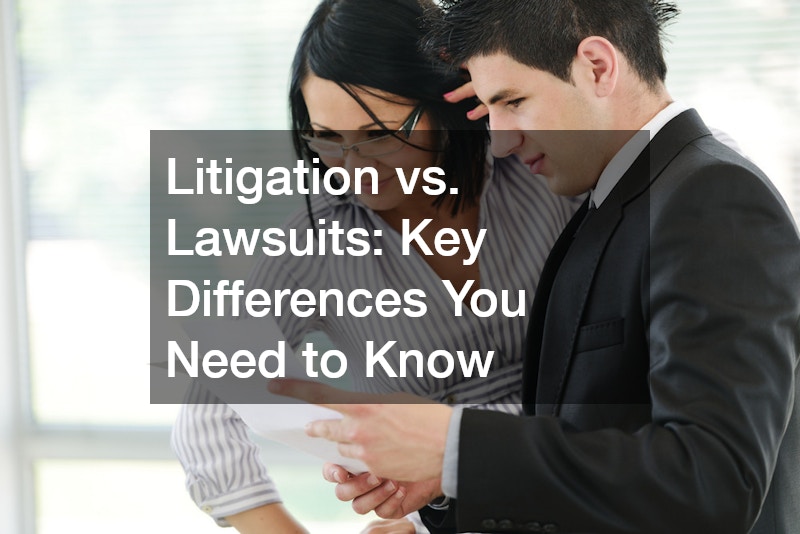This article will provide clarification on the differences between lawsuits and litigation within the Australian legal system. Continue reading to find out more about these essential aspects of law.
1. What Is Litigation in Australian Law?
Litigation is the legal process that involves bringing a case to court to settle a dispute. Litigation involves several steps, including filing a complaint and moving forward with discovery, motions, or a trial. In most cases, the outcome of litigation will be a settlement or judgment that settles the dispute.
Litigation requires the expertise and experience of legal professionals, such as barristers or solicitors, judges, and legal support staff, to navigate Australia’s complex legal system. Depending on the complexity of the case and who’s involved, the process can be lengthy and expensive. Litigation is used in cases where alternative dispute resolution or negotiation methods have failed.
Business disputes, contract violations, and civil rights violations often trigger litigation. Parties to a lawsuit may hire a business solicitor, a family lawyer or another legal specialist depending on the nature and circumstances of the case.
2. What Constitutes a Lawsuit?
A lawsuit is an action brought by one party to another in order to obtain a remedy for damages or compensation. The process usually begins with the filing of a petition or claim in an Australian court. A lawsuit’s resolution can be a judgment, settlement or dismissal based on evidence.
The defendant is given the opportunity to respond by serving the legal documents. Depending on the parties’ desires, a lawsuit can be resolved through negotiation, mediation, arbitration, or trial. A personal injury lawyer or a family lawyer can be vital in achieving a positive outcome.
In Australia, lawsuits are often filed for personal injury cases, contract disputes and property maintenance concerns. The parties involved in a suit may incur costs, such as court fees, legal fees and damages.
3. Common Ground: How Litigation and Lawsuits Overlap
Both litigation and a suit involve court proceedings to resolve disputes or obtain legal remedies. To reach a settlement, they may use similar methods of resolution, such as mediation, negotiation, or trial. Both litigation and lawsuits involve court involvement, as judges preside over the cases and make legal decisions based on the evidence presented.
In both litigation and a court case, legal representation is required to represent the interests of the parties and navigate the legal complexity of the case. Parties can choose to hire a business solicitor, family lawyer or another legal professional based on the needs of their case. The court system offers a framework to resolve legal disputes by following established legal procedures.
If parties are unable to reach an agreement through negotiation or other dispute resolution methods, a lawsuit or litigation may be the next step in seeking legal remedies. Legal action is sometimes necessary to protect rights and interests, whether it’s in a personal injury case or a property maintenance dispute.
4. Key Differences Between Litigation and a Lawsuit
Litigation and lawsuits are similar in that they both involve legal proceedings. However, their scope of action is different, and so are the types of cases. Litigation includes a wide range of legal actions, including lawsuits and administrative proceedings. A lawsuit is a formal legal action that’s initiated in court to obtain a remedy or compensation.
Litigation can involve complex issues such as business disputes, class action lawsuits or legal issues with multiple facets that require legal expertise. On the other hand, lawsuits are usually about individual disputes, personal injury claims, or small claims court cases that can be settled through legal action. Legal representation can vary between litigation and lawsuits, depending on whether the parties choose solicitors or barristers.
In some situations, litigation is preferred to a lawsuit because of its thorough legal process and the ability to deal with complex legal issues. In contrast, lawsuits are often preferred for cases or disputes that don’t require lengthy legal proceedings. When faced with legal disputes, it is important to know the difference between litigation and lawsuits.
5. Why Choose Litigation Over a Lawsuit?
In cases where complex legal issues require a thorough legal process, litigation may be preferable to a lawsuit. The thoroughness of litigation can be beneficial in cases involving multiple parties, complex legal issues, or business disputes. Legal representation from a commercial lawyer, divorce lawyer, or other legal specialist can be essential in navigating litigation’s complexities.
In cases where there are substantial assets at stake and expert legal handling is required, a family law attorney might be needed. Litigation is a structured way to resolve legal disputes by using established legal procedures. As part of the litigation, parties may be required to pay legal fees, court costs, and expert witness expenses.
In complex legal disputes, the parties can achieve a favourable outcome by involving themselves in litigation, which includes negotiation and court participation. In cases requiring specialised legal knowledge and thorough legal proceedings, litigation may be preferred over a lawsuit.
6. When Is a Lawsuit the Better Option?
In cases of individual disputes, personal injury claims, or small claims court, a lawsuit is often preferred to litigation. A lawsuit can help resolve legal disputes or individual disputes. A lawsuit can be handled by a family lawyer, personal injury lawyer or any other professional, depending on the nature and circumstances of the case.
Individuals often file lawsuits for compensation or legal remedies in small claims court over property maintenance issues and personal injury. Parties to a lawsuit should consider legal fees, court costs, and the potential damages awarded. Negotiation, mediation, arbitration, or a trial may be used to resolve a lawsuit, depending on what the parties prefer.
A lawsuit can be used to resolve individual disputes or legal issues without the need for a lengthy legal process. In a lawsuit, parties may hire legal representation to represent their interests, seek compensation or legal remedies.
7. The Costs of Litigation
Legal fees, court costs for filing documents and appearing in court, and expert witness fees for specialised testimony can be included as litigation costs. Costs can be affected by the complexity of a case and the number and duration of parties involved in the litigation. Legal representation, court involvement, and negotiation influence litigation costs.
The costs of litigation can be high for both parties, from the filing fee and solicitor’s fees to any damages that may be awarded or paid. The litigation costs can be increased by court expenses such as transcripts, appearances in court, and other legal procedures. In cases where specialised knowledge is required to support legal arguments, expert witness fees can be required.
The thoroughness of the court process and the need for expert legal representation may lead to higher costs. Budgeting for legal costs, court fees and other expenses associated with legal proceedings may be necessary for parties involved in litigation. Understanding the costs of litigation can help parties to make informed decisions in complex legal disputes.
8. What Are the Costs Involved in Lawsuits?

Costs of a lawsuit may include the filing fee for initiating legal action, the solicitor’s fees to represent you, and any damages that are awarded or paid in the settlement. Costs can be affected by the complexity of a case, duration of legal proceedings and resolution method. Legal representation can be sought from a family lawyer, personal injury lawyer, or other legal specialist for their expertise in navigating the legal process.
The cost of a lawyer’s services can vary depending on a number of factors, including the type and nature of the case, legal services rendered, and the method used to resolve the dispute. The cost of the lawsuit may increase if court expenses such as transcripts, filing fees and other legal proceedings are included. Damages that are awarded or paid in settlement can have a financial impact on the outcome of a lawsuit.
A lawsuit may be less expensive than litigation due to its streamlined process and the legal issues that are involved. As part of the legal process, parties involved in a suit may need to budget for filing costs, solicitor fees and possible damages. Understanding the costs of lawsuits will help you assess the financial impact of taking legal action.
9. Can Litigation and Lawsuits Overlap in Legal Matters?
In cases of complex legal disputes requiring comprehensive legal action, litigation and lawsuits can overlap. In some cases, multiple parties are involved in the lawsuit. Each party may seek compensation or legal remedies for their claim. The appeals process may also cause overlap between lawsuits and litigation since parties can challenge court decisions or request a review of a judgment.
Appeals can extend the legal process and increase litigation costs. Legal representation can be crucial in helping parties navigate the appeals process. Parties can hire barristers or solicitors who specialise in appellate law to represent their interests during the appeals process.
Parties may face higher costs in cases of overlap between litigation and lawsuits due to the lengthy legal proceedings and additional steps required for the appeals process. Negotiation, court involvement, and expert legal representation are all essential to navigating the complex legal issues of overlapping lawsuits and litigation. Understanding the overlap of litigation and lawsuits will help parties prepare for any legal challenges that may arise.
10. The Role of Jurisdiction in Litigation and Lawsuits
The jurisdiction can have a variety of effects on litigation, including the court selection process, forum shopping and applicable laws. Parties can choose courts based on jurisdiction, legal expertise, or proximity. Forum shopping is the practice of choosing a court or jurisdiction that offers perceived benefits to pursue legal action.
The applicable laws can vary depending on where the legal action was initiated. This will affect the legal arguments, remedies and outcomes that are available to all parties. Understanding jurisdictional issues will help parties navigate the legal system, choose the right court, and effectively advocate for their own interests. Legal representation is often necessary to resolve jurisdictional issues and ensure compliance with laws in the relevant jurisdiction.
In Australia, jurisdiction plays a major role in deciding whether to file a lawsuit, or initiate litigation. Both federal and state courts have authority over certain types of legal issues. To achieve the best possible outcome, parties may need to consult with lawyers who understand the nuances of Australian jurisdictional law.
